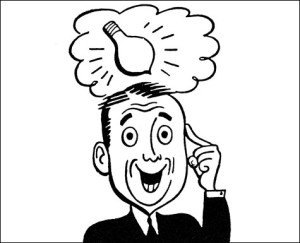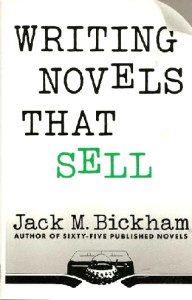The other day I got a lovely email that began:
I want to send you a big, sincere ‘thank you’ for writing your book on plot and structure.
After trawling through many books on plotting and feeling more and more confused and anxious it was a relief to come across your book. Finally I began having ‘aha!’ moments – and I’ve only read three chapters!
You are so encouraging and the exercises are really useful – although now I find myself watching television and asking ‘what if?’ a great deal of the time…
If an ex-lawyer can still have working cockles in his heart, mine were warmed. I love hearing when a writer starts to get it. An “aha moment” is exactly what I strive to provide in my teaching. Because it was just such a moment that put me on the path to selling my work.
I know exactly when it was, too, because I was keeping a journal of my writing quest. On September 15, 1990, I wrote these words:
EPIPHANY!
Light! A bulb! A flash! A revelation! My muse on fire!
I feel like I’ve suddenly “clicked into” how to write . . . I mean, everything I’ve been reading and brooding about has finally locked. There is this tremendous rush of exhilaration. It just happened, and now I feel like everything I write will be at least GOOD, but can also be EXCELLENT.
I was writing screenplays at the time, and I’d written five or six over two years without success. But the next one I wrote was optioned and got me into a top agency. I optioned other properties, too, and did some assignment work (including a treatment for the late, great Whitney Houston). But when the projects didn’t get pushed up the ladder (an old Hollywood story) I got frustrated and wrote a novel using the same revealed wisdom. The novel sold. Then I wrote a legal thriller and got a five book contract. My career as a novelist was launched.
And all of it I trace back to that epiphany. Here’s the story.
I was a member of the Writer’s Digest Book Club at the time. One of their offerings was Jack Bickham’s Writing Novels That Sell. I’d been reading screenwriting books, like Syd Field’s Screenplay and Linda Seger’s Making a Good Script Great. I thought, well, there may be some cross-over here from the novel world, and I bought the book.
Bickham advised this was a book for people wanting to get serious about becoming professional writers. Not fluff, only what had worked for him and his writing students at the University of Oklahoma. He said it should be studied sequentially, as each chapter built upon the last.
So that’s what I did, starting at page one and working my way through. And when I got to Chapter 8, covering “scene and sequel,” that’s when the bulbs started popping in my brain.
Up to that time I did not have a strategic approach to writing the next scene. I just sort of let it bubble up in my imagination (or had committed to it on an index card) and went for it. But my scripts weren’t working. People told me so, but couldn’t tell me why, which was frustrating beyond measure.
Now, suddenly, I knew why they weren’t working. A superb writing instructor had nailed it and explained it to me.
In brief, a scene is a unit of action made up of a goal, conflict and disaster. There are of course nuances and variations, but all of them emanate from this basic understanding. The disaster doesn’t always mean something huge, though it sometimes is. It is a setback of some sort, making the hero’s situation worse.
I have the key paragraph highlighted in yellow, and underlined in red, in Bickham’s book:
We make our story go forward by pushing our hero backward, farther and farther from his ultimate goal, through scene disasters. The reader reads excitedly, roots for the hero––then is crushed with him. The novel flies along, lifelike, dramatic, suspenseful, hard to put down, filled with twists, surprises and setbacks––and more and more tension as well as admiration for the battered hero who simply won’t quit.
Bam. Boom. Bingo. This was my breakthrough, my foundation. And it’s never let me down since.
So I wonder, have you ever had an “aha moment” in your writing? Maybe it came when you first realized something was (or wasn’t) working for you on the page. Maybe it was while you were reading a novel and thought, “Oh, now I see!”
Or maybe you’ve had a series of these moments, perhaps not as dramatic as my own, but meaningful just the same.
Let’s hear about them.
***
NOTE: I will be on the road teaching my two-day intensive “Next Level” seminar this year. The cities and dates have just been announced:
Austin, TX, June 16 & 17
Nashville, TN, August 11 & 12
Cincinnati, OH, September 15 & 16
For further information, testimonials and sign-up forms, go here.


